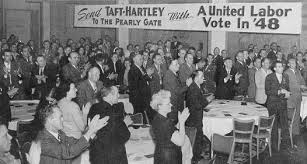Date in History : June 23, 1947
Taft-Hartley Act – June 23, 1947
It was not until two years after the close of World War II that
the first major modification of the National Labor Relations Act was
enacted. In 1947, the Labor-Management Relations Act — also known as
the Taft-Hartley Act, after its two sponsors, Sen. Robert A. Taft
(OH-R) and Rep. Fred A. Hartley, Jr. (NJ-R) — was passed by
Congress, Vetoed by President Truman (on the basis that it was
anti-Labor), and then reapproved over his veto. This comprehensive
measure:
(*) established procedures for delaying or averting so-called
“national emergency” strikes;
(*) excluded supervisory employees from coverage of the
Wagner Act;
(*) prohibited the “closed shop” altogether;
(*) banned closed-shop union hiring halls that discriminated against
non-union members.
Taft-Hartley retained the Wagner Act’s basic guarantees of workers’
rights to join unions, bargain collectively, and strike [Gee, thanks!
–HB], and retained the same list of unfair labor practices forbidden
to employers. The Act also added a list of unfair labor practices
forbidden to unions. These included:
(*) restraint or coercion of workers exercising their rights to
bargain through representatives of their choosing;
(*) coercion of an employer in his choice of persons to represent him
in discussions with unions;
(*) refusal of unions to bargain collectively;
(*) barring a worker from employment because he had been denied union
membership for any reason except non-payment of dues;
(*) striking to force an employer or self-employed person to join a
union;
(*) secondary boycotts;
(*) various types of strikes or boycotts involving
Inter-union conflict or jurisdictional agreements;
(*) Levying of excessive union initiation fees;
(*) certain forms of “featherbedding” (payment for work
not actually performed).
The Taft-Hartley Act included a number of other provisions. These included:
(*) authorization of suits against unions for violations of their
economic contracts;
(*) authorization of damage suits for economic losses
caused by secondary boycotts and certain strikes;
(*) relaxation of the Norris-LaGuardia Act to permit injunctions
against specified categories of unfair labor practice;
(*) establishment of a 60-day no-strike and no-lockout notice period
for any party seeking to cancel an existing collective bargaining
agreement;
(*) a requirement that unions desiring status under the law and
recourse to NLRB protection file specified financial reports and
documents with the U.S. Department of Labor;
(*) the abolition of the U.S. Conciliation Service and establishment
of the Federal Mediation and Conciliation Service;
(*) a prohibition against corporate or union contributions or
expenditures with respect to elections to any Federal office;
(*) a reorganization of the NLRB and a limitation on its power;
(*) a prohibition on strikes against the government;
(*) the banning of various types of employer payments to union
officials.

